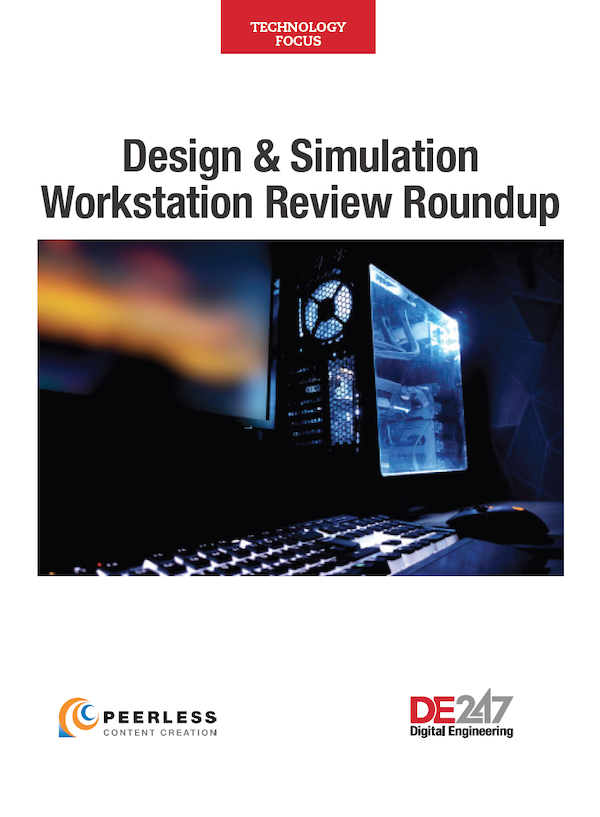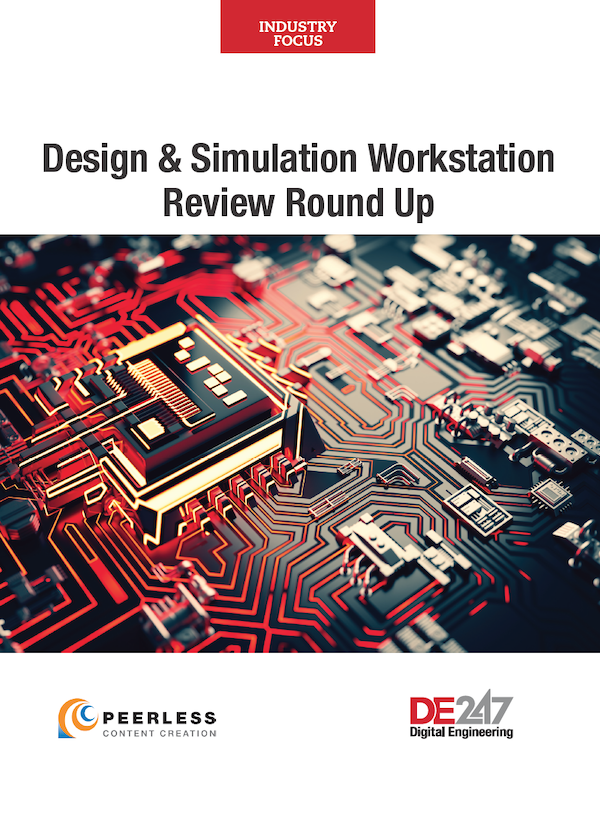Lenovo ThinkPad P52s: Thin, Lightweight and Affordable

Image courtesy of Lenovo.
Latest News
September 1, 2018
The Lenovo ThinkPad P series mobile workstations have always been an impressive fusing of portability and power. The ThinkPad P71 we recently reviewed (DE May 2018) proved itself the new mobile price/performance leader. This made us understandably enthusiastic when Lenovo offered to send us its newest addition to the P series lineup, the ThinkPad P52s.
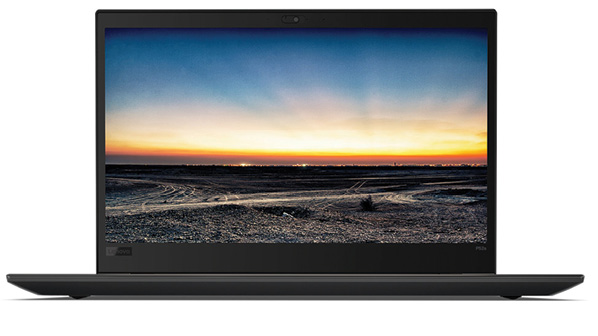 The thin, lightweight Lenovo ThinkPad P52s is housed in a dark gray sculpted case and delivers decent performance at an affordable price. Images courtesy of Lenovo.
The thin, lightweight Lenovo ThinkPad P52s is housed in a dark gray sculpted case and delivers decent performance at an affordable price. Images courtesy of Lenovo.The Lenovo ThinkPad P52s is the thinnest and lightest mobile workstation yet from the Chinese manufacturer, offering a choice of 8th generation Intel quad-core CPUs in an Ultrabook format. The system comes housed in a charcoal gray case made of glass-fiber reinforced plastic. Overall, it measures 14.4x10.0x0.8 in. and weighs just 4.39 lbs. The small, 65-watt power supply (4.25x1.75x1.13 in.) adds just 0.61 lbs. more, including its cables.
All configurations of the P52s include an NVIDIA Quadro P500 discrete graphics processing unit (GPU). Prices start at $1,070 for a system equipped with a 1.7GHz Intel Core i7-8350U quad-core processor, a 1920x1080 display, 8GB of RAM, a 500GB 7200rpm SATA drive, Windows 10 Home and a one-year warranty. But, of course, the system we received included several extra-cost options.
Keyboard and Display
Raising the lid reveals a 15.6-in. display and a spill-resistant keyboard with 105 mostly full-size keys, including a separate numeric keypad. Lenovo keyboards are among the best available in any laptop, and the P52s is no exception. The keyboard in our evaluation unit included backlighting, which is $25 extra. Lenovo also offers a choice of three in-plane switching anti-glare display panels: two full high-definition (1920x1080) 2K displays (with or without touch) and a ultra high-definition (3840x2160) 4K display (without touch). The 1920x1080 panel with multi-touch is just $85 more, while the 4K panel included in our evaluation unit added $191.
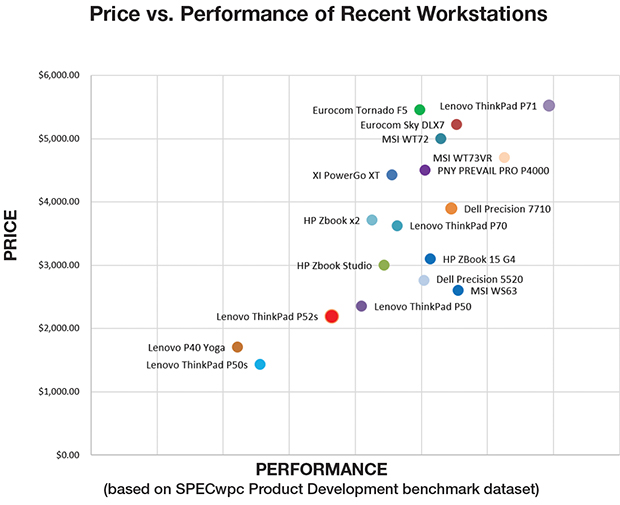
A 720p HD webcam flanked by a pair of microphones is centered above the display. A similar camera with infrared ($25) is available on all but the non-touch enabled FHD display and is required if you want to use facial recognition to sign in to your computer.
A round power button is located in the upper-right corner, just above the numeric keypad, and a 3.8x2.75-in. touchpad with three buttons is centered below the spacebar. There is also a red pointing stick nestled between the G, H and B keys. A spot for an optional fingerprint reader ($11) is just to the right of the touchpad. The caps lock and number lock keys each have their own LEDs as do separate keys dedicated to the speakers, microphone and function lock. The system includes a pair of two-watt speakers.
Modest Options
In addition to the CPU included in the base configuration, Lenovo also offers the P52s with a 1.8GHz Intel Core i7-8550U or the 1.9GHz Intel Core i7-8650U included in our evaluation unit (adding $170). Intel’s Kaby Lake processor, which also includes integrated Intel UHD Graphics 620, has an 8MB SmartCache, a 15-watt thermal design power rating and a maximum turbo frequency of 4.2GHz.
Although the base system includes just 8GB of memory, the ThinkPad P52s can accommodate up to 32GB of RAM. Our system came with 16GB installed using a pair of 2400MHz memory modules, increasing the price by $106. A single 16GB dual-inline memory module is the same price, however; something to consider if you anticipate adding more memory in the future.
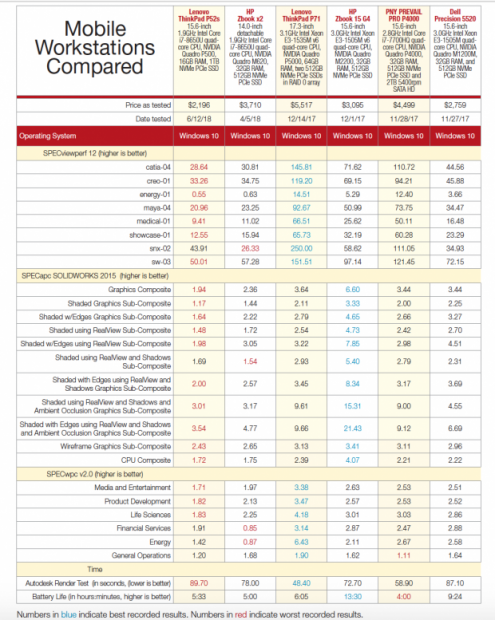 Comparison of mobile workstations. Numbers in blue indicate best recorded results. Numbers in red indicate worst recorded results. Click on chart for larger version.
Comparison of mobile workstations. Numbers in blue indicate best recorded results. Numbers in red indicate worst recorded results. Click on chart for larger version.Lenovo offers a choice of storage devices, including hard drives of up to 1TB and solid-state drives ranging from 256GB to 1TB. Our evaluation came with a 1TB Samsung PCIe NVMe M.2 drive, which added $626. Although the system only accommodates a single drive, Lenovo does offer an optional 16GB solid-state Intel Optane PCIe drive on systems equipped with SATA hard drives.
The ThinkPad P52s is a bit more limited in terms of connectivity than other Lenovo mobile workstations we have reviewed. The right side provides a combination headphone/microphone combo jack, a four-in-one media-card slot (MMC, SD, SDHC, SDXC), a pair of USB 3.1 ports including one that is always on when the system is connected to AC power, an HDMI port, an RJ-45 ethernet jack and a lock slot.
The left side houses a pair of USB Type-C connectors, one of which is also Thunderbolt 3 compatible. These ports can transfer data, charge the computer or connect the computer to an external display. There is also a docking station connector (a ThinkPad Thunderbolt dock currently sells for $196) and room for an optional Smart-Card reader (a $10 option). Intel dual-band wireless-AC 8265 plus Bluetooth 4.1 comes standard.
The P52s offers a somewhat unique battery arrangement. A four-cell Li-Ion 32Whr front battery is housed inside the system. You then have a choice of removable rear batteries that can be swapped out while the system is running. In addition to the standard three-cell 24Whr rear battery provided with our evaluation unit, Lenovo also offers a six-cell 48Whr battery for $14 more or a six-cell 72Whr cylindrical battery for $29. The pair of standard batteries kept our system running for 5.5 hours. The system remained cool and nearly silent throughout our tests, even when under heavy compute loads.
Lackluster Performance
Although we have come to expect Lenovo workstations to deliver top-of-class performance, we weren’t expecting that same level of performance from this thin, lightweight system.
As expected, on the SPECviewperf benchmark, which focuses on graphics, the Lenovo ThinkPad P52s was the slowest mobile workstation we have tested in the past three years. Only the older ThinkPad P50s and P40 Yoga have yielded slower graphic performance. The results on the SPECapc SOLIDWORKS benchmark were similarly lackluster.
The P52s also ranked near the bottom of the field on the very demanding SPECwpc benchmark, although it did outperform the HP ZBook x2 on some of the tests. Its average time of 89.7 seconds to complete our AutoCAD rendering test was also among the slowest recorded for a mobile workstation over the past three years. But that result was nearly twice as fast as the ThinkPad P50s (DE, March 2017).
Although the base configuration comes with Windows 10 Home, our system included Windows 10 Pro, a $30 upgrade. The standard warranty covers the system for just one year with depot or carry-in service. Additional coverage is available at the time of purchase that can extend the warranty for up to five years, including accidental damage protection. Our system came with a three-year warranty.
The Lenovo ThinkPad P52s is certified for more than 100 applications from independent software vendors including Autodesk, Dassault Systèmes, PTC and Siemens PLM Software. The P52s has also passed 11 MIL-STD 810G military certification tests that demonstrate the durability of the system and meet requirements for government and military customers.
As configured, the ThinkPad P52s we received priced out at $2,196 after an automatic 10% online discount, making this new ThinkPad one of the most affordable mobile workstations on the market today. Although it won’t replace a desktop system, it will certainly enable the ability to get work done while on the go.
More Lenovo Coverage

For More Info
Lenovo ThinkPad P52s
- Price: $2,196 as tested ($1,070 base price)
- Size: 14.4x10.0x0.8 in. (WxHxD) notebook
- Weight: 4.39 lbs. (plus 0.61-lb. external power supply)
- CPU: Intel Core i7-8650U 1.9GHz quad-core w/ 8MB cache
- Memory: 16GB DDR4 (2x8GB) at 2400MHz
- Graphics: NVIDIA Quadro P500 (2GB GDDR5 memory, 256 CUDA cores)
- LCD: 15.6-in. 4K (3840x2160) IPS
- Hard Disk: Samsung 1TB PCIe NVMe M.2
- Floppy: None
- Optical: None
- Audio: Built-in speakers, headphone/microphone jack, built-in microphone array
- Network: Integrated Intel Dual Band Wireless-AC 8265 plus Bluetooth 4.1, one RJ45 gigabit Ethernet port
- Other: Two USB 3.1 (one always on), one USB Type-C, One USB 3.1 Type-C/Thunderbolt 3, HDMI, 4-in-1 media card slot, 720p webcam, dock connector
- Keyboard: Integrated 105-key full-size backlit keyboard with numeric keypad
- Pointing Device: Integrated touchpad and pointing stick with three buttons
Subscribe to our FREE magazine, FREE email newsletters or both!
Latest News
About the Author
David Cohn is a consultant and technical writer based in Bellingham, WA, and has been benchmarking PCs since 1984. He is a Contributing Editor to Digital Engineering, the former senior content manager at 4D Technologies, and the author of more than a dozen books. Email at [email protected] or visit his website at www.dscohn.com.
Follow DE




